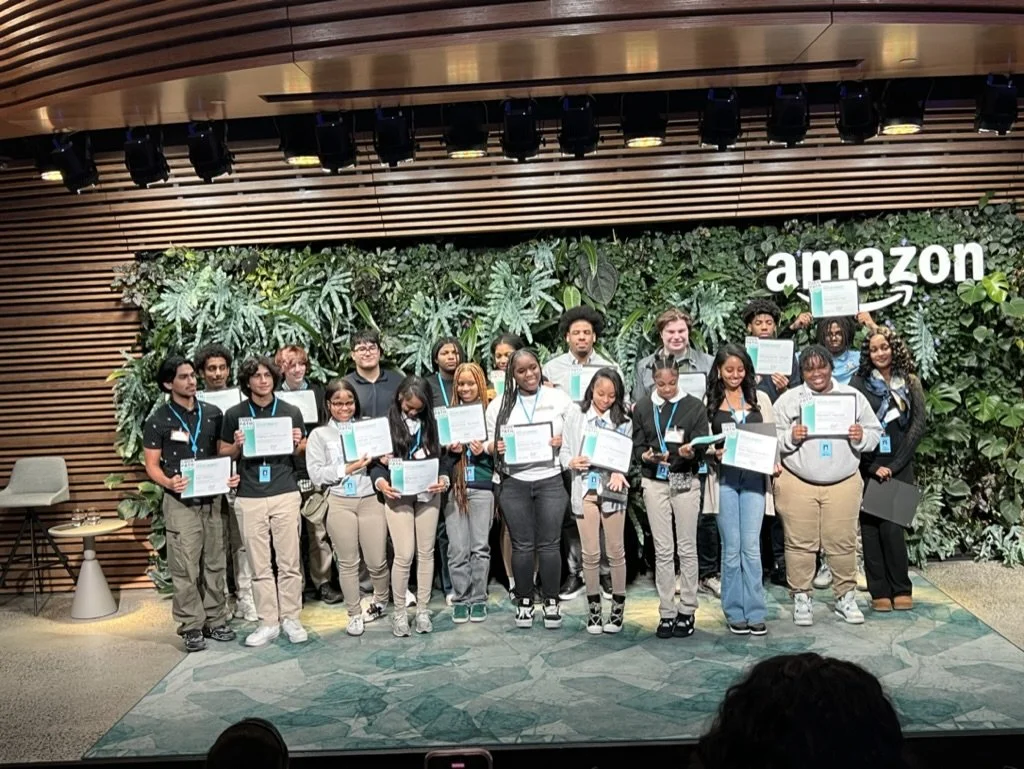
Why We Invested:
CareerWise DC
What is CareerWise DC?
CareerWise DC is a two- or three-year, modern youth apprenticeship program that trains—and pays—young people to do meaningful work while gaining valuable skills alongside professionals. Apprentices are hired directly by employer partners, work over 2,000 hours, earn above minimum wage (totaling roughly $35,000), master occupational competencies, and gain nationally recognized industry certifications and/or debt-free college credit. Critically, students maintain "permeability"—the ability to transition into either full-time employment or continued postsecondary education without closing off future options.
Since CityWorks DC (which runs CareerWise DC) launched in 2020 with 14 apprentices, 4 high schools, and 6 employers, CareerWise DC has expanded significantly to reach 70 current and former apprentices through partnerships with 15 high schools and 20+ employers, including Amazon, Accenture, and Enlightened, Inc. Each year, new apprentice cohorts are added.
Apprenticeships are currently offered in four high-demand sectors: Information Technology, Business Operations, Finance, and Healthcare.
The CareerWise DC model, part of the CareerWise USA network, is a win-win:
For students: CareerWise DC acts as an “options multiplier,” helping students earn while they learn, build a professional network, and launch their career into high wage, high demand fields—all while still in high school.
For employers: CareerWise DC builds a diverse, local talent pipeline, increases productivity, reduces recruiting costs, and improves retention.
Why did the Goodman Philanthropies invest?
America urgently needs more high-quality alternatives to the traditional four-year college path. Apprenticeships—where young people earn a wage, gain work experience, and earn portable credentials—represent one of the most promising solutions for boosting economic mobility.
However, the U.S. apprenticeship system remains limited:
In 2024, there were 680,000 registered apprentices across 27,000 programs nationwide—a modest number for a country of over 330 million.
The current system is difficult for employers to navigate, lacks sufficient funding, and remains disconnected from broader education and workforce pipelines.
Participation skews heavily toward white males in their late 20’s, limiting equity and access.
We believe the solution lies in modernizing and expanding youth apprenticeships. The system must be restructured to enable:
Dual-track permeability, allowing young people to move fluidly between classroom learning and on-the-job experience
Greater equity, through wraparound supports like childcare and transportation
Better alignment with industry needs, helping close persistent skill gaps
Cultural change, challenging outdated stigmas around non-college career pathways
CareerWise DC directly addresses these challenges—creating a national proof point for what modern youth apprenticeship can look like. Under the leadership of Jennie Niles, a proven and innovative leader, CityWorks DC operates CareerWise DC alongside systems change initiatives on an annual organizational budget of ~$3 million, with a lean team and an annual investment of ~$12,000 per apprentice. Goodman Philanthropies is providing a grant of $500,000 over two years to contribute to overall general operations of CareerWise DC.
What impact are we hoping to achieve?
Near-Term Goals
Our timely investment fills a critical funding gap left by the temporary pause in support from national funders and enables CareerWise DC to:
Expand into Virginia high schools
Grow healthcare apprenticeships in partnership with DC-based health systems
Long-Term Vision
We believe CareerWise DC can serve as a national proof point, alongside its peer programs under the CareerWise USA umbrella organization, for how to build a system of modern youth apprenticeship across the U.S.—one that mirrors the success of global counterparts like Switzerland and Germany. Over time, this model will:
Reshape how the U.S. approaches workforce development
Expand “earn-and-learn” pathways
Increase economic mobility for historically underserved populations

